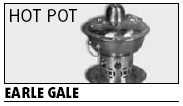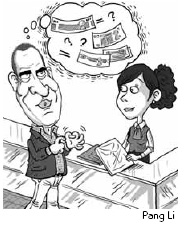So how is that RMB in dollars, er, pounds, no Euro?
By Earle Gale ( China Daily ) Updated: 2009-11-10 14:54:49
While life in Beijing has turned out to be better than I dared hope before I got here six months ago, one little issue that has been with me since day one still niggles - my incomprehensible inability to get to grips with the money.
Just how much did I earn last month? And how much does stuff cost? Does my income go further here? Is the guy who is trying to sell me something from the back of a bicycle outside the subway station attempting to rip me off or is he an honest trader offering great value for money and a few seconds of warm friendship?
These are questions I can only answer satisfactorily - given a brain the size of an Olympic high-diver's swimming trunks - by converting RMB into money I am familiar with.
So, I tend to go through the challenging (for me) process of figuring out what things cost in Canadian dollars (divide by six point something).
Then, invariably, I remember that Canadianizing the price-tag is not nearly enough.
You see, for the entire 14 years I lived in the "True North, Strong and Free", I converted Canadian dollars into British pounds (divide by 1.8) - the currency of my formative years.
So, here in Beijing, I spend a good deal of time standing in stores with a pained expression on my face doing mental arithmetic. The answer is always the same, by the way: The item I want to buy is great value for money!
I was thinking about all of this unnecessary mathematics recently and wondering why the heck I bothered when I suddenly realized just how much I have grown to become like my dear departed grandfather.
He was forever converting money into units he could understand.

My childhood in England was replete with instances of Gramps converting new "Decimal Money" into "Old Money" - the pounds, shillings and pence he grew up with.
Old Money was replaced in 1971 with a far simpler system: 100 pence equals 1 pound. But Gramps refused to buy into the new sterling and hankered after his old money, right up to his passing in 1996.
The system my grandfather preferred was the one that had 4 farthings in a penny, 6 pennies in a sixpence, 12 pennies or 2 sixpences in a shilling, 5 shillings in a crown and 4 crowns or 20 shillings or 240 pennies in a pound.
It was always funny to watch him convert simple, straightforward new Decimal Money back into convoluted Old Money. But my amusement went off the scale and edged toward enraptured incredulity one glorious fortnight when the whole family went on holiday to Yugoslavia.
We were there in the late 1980s when the dinar was suffering from the kind of hyperinflation the Zimbabweans are seeing today.
In their house, my grandmother held the purse strings and each time granddad wanted to buy something he had to ask her for the money.
"Ten thousand?" she'd exclaim with genuine panic in her voice. "Ten thousand for a cup of tea?"
Then, my father would pipe up, telling my grandparents what 10,000 dinars was equal to in New Money - and my granddad would take that little nugget of information and convert it back into his beloved Old Money.
"It's less than a shilling," he'd tell her in disbelief.
"Oh, well, in that case "
And she got the money out of her handbag and handed it over to him.
It was a charade that they played out a dozen times a day before their bemused grandson.
And, now I realize, it's a charade I am repeating today.
The apple doesn't fall far from the tree.
|
|
|
|
|
|
|
|


























 Raymond Zhou:
Raymond Zhou: Pauline D Loh:
Pauline D Loh: Hot Pot
Hot Pot Eco China
Eco China China Dream
China Dream China Face
China Face






